|
Biography's
Sergent J. L. Maiden
Imperial Light Horse
Late UMVOTI MOUNTED RIFLES -Service # 4113 (Volunteer)
Lt. Maiden, CO 53 Commando, CONGO Mercenary (1963/65)
Sgt Jack Maiden with Ribbon Bar, including the Efficiency Medal on extreme right
* Photo’s of Jack Maiden courtesy of Mr & Mrs Roy Maiden (2010) - DURBAN
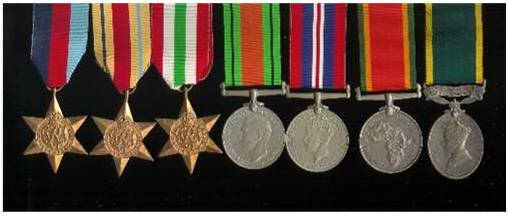 |
Jack Lefevre Maiden attested on the 22 April 1940, joining the UMVOTI MOUNTED RIFLES as a Sergeant (confirmed on the 25/06/1940)– having served with the UMR for the previous 4 years. After a spell in Hospital he was detached from the UMR and joined the ILH before eventually posted to th 14th Motorised Brigade HQ Signal Squadron on 14/11/1941.
Jack Maiden took part in the battle of Tobruk, and when Tobuk fell to German Troops he was reported MIA – See telegraph to his parents dated 30/06/1942. However, a 2nd telegraph dated 04/07/1942 confirms his escape and arrival in Cairo.
Promoted to S/Sgt wef 07/02/1945 & awarded the Efficiency Medal on the same day.
Sgt Maiden served with the UMVOTI Mounted Rifles from July 1940 to July 1941 in Egypt & Libya. Then posted to ILH (Imperial Light Horse), is an Armoured Car Reconnaissance Regiment of the South African Army during July 1941 (Egypt) to March 1943. Then part of 14 S.A. Motorised Brigade in Egypt and Italy until July 1945, returning to Egypt during July’45. Emplaned at Cairo for the Union on 03/08/1945.
Jack is discharged on 21.05.1946 and takes up a post as Postal Clerk with the GPO in Nairobi.
In 1963/64 Jack is recruited by Col. 'Mad' Mike Hoare as Commanding Officer (Lieutenant) of the Mercenary outfit - 53 Commando - in the Congo. He participates, together with the belgian Para's, in the rescue of civilians in the town of Stanleyville in Nov/Dec 1964.
Medals Earned:
 |
|
| |
|
 |
Africa Star & 8th Army Clasp
|
| |
|
 |
|
| |
|
 |
|
| |
|
 |
The War Medal 1939 - 1945
|
| |
|
 |
African Service Medal |
| |
|
 |
Efficiency Medal, Geo VI – Bi-lingual Suspender |
| |
|
 |
Possible Award: Military Cross of the Congo (1965) |
| |
|
Missing in action Telegram after battle of Tobruk
Found Telegram
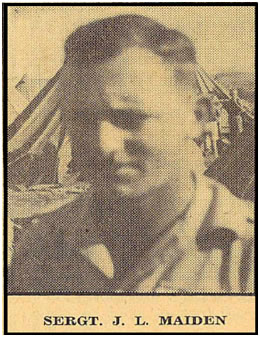
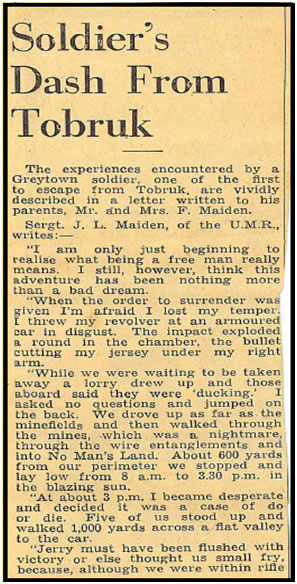 ............... ...............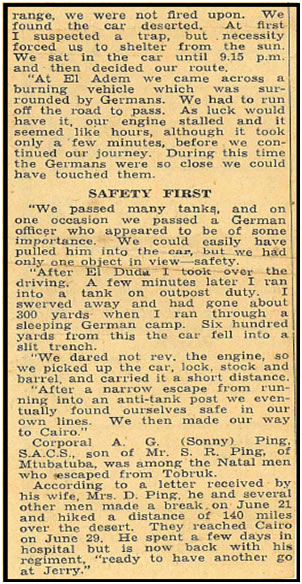
Service Card and Medical Confirmation
History of Service from 1940 - 1945
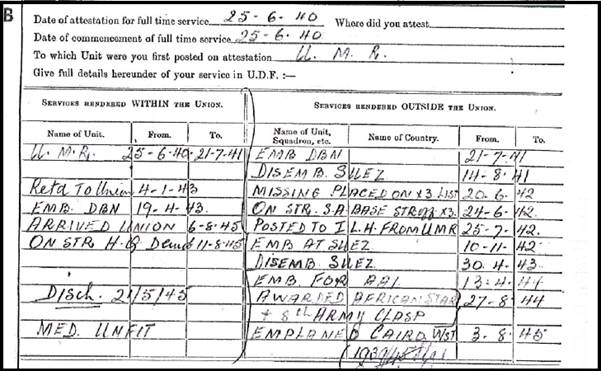
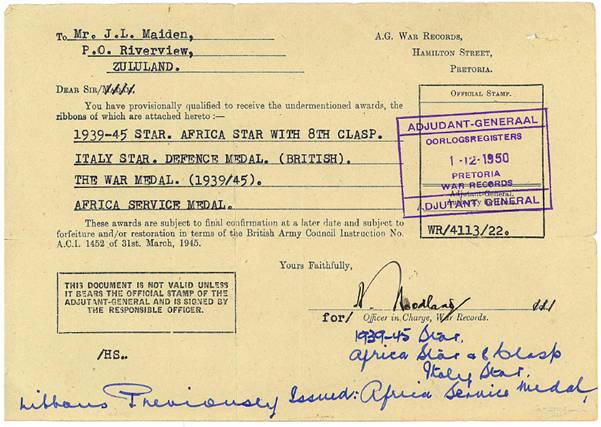
Confirmation of the Effeciency Medal award
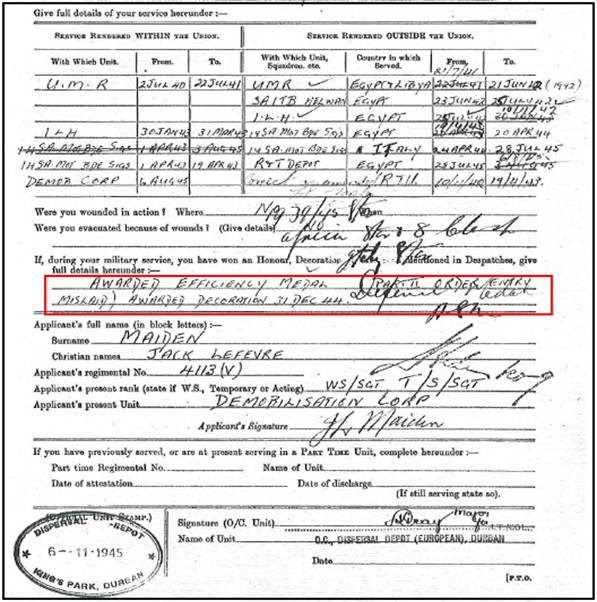
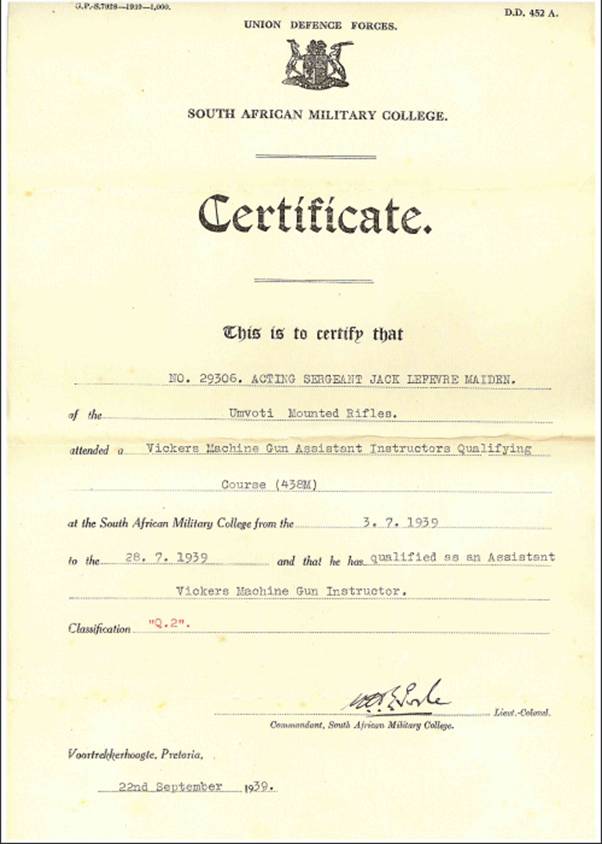

UMR embarking from DURBAN Harbour for North Africa on 21-7-1941and disembarked Suez on 14- 08-1941
On the back of this photo a caption
“Tough, mighty tough in the West”
(Taken in the Western Desert) |
|
Sgt. Jack Maiden |
Spoke to Mrs Maiden –Jack’s brothers wife : TEL 031 7020874 (Pinetown). 1st JULY 2010.
Photos courtesy of Mrs Gwen Maiden – Jack’s wife.
LT. MAIDEN 53 COMMANDO UNIT - CONGO 1964/65
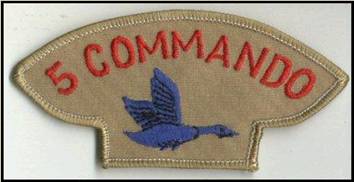
In 1964 Jack is recruited by Col. Mike Hoare to lead one of the Commando Units of 5 Commando, Armee’ Nationale Congolaise (The Congolese national Army ) He his promoted to Lt. and commands 53 Commando, reporting directly to Hoare. Maidens 2IC is 2Lt George Schroeder (Who is awarded the Military Medal of the Congo during later campaigns – EX SADF Parra)
Jack is “promoted” to 2IC of the whole 5 Commando when Hoare hands over the reins to Ian Gordon, with Jack reporting to Gordon (Dec 1964):

Extracts from Hoares Book – “Congo Mercenary”
Page 82/83:
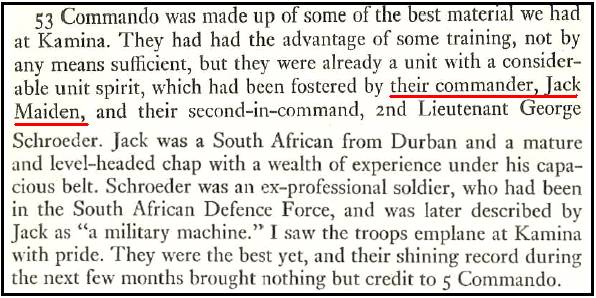
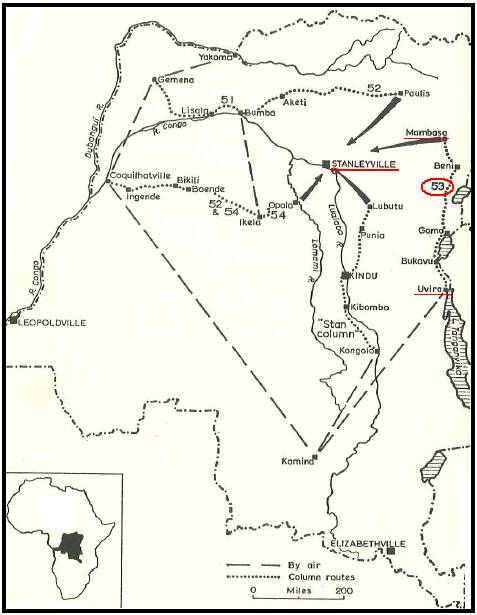
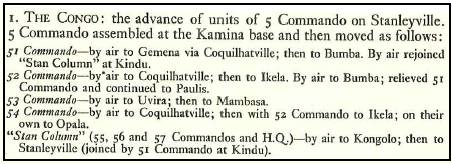
Letter from the Ambassador of Belgium in the CONGO thanking LT. Maiden & his men
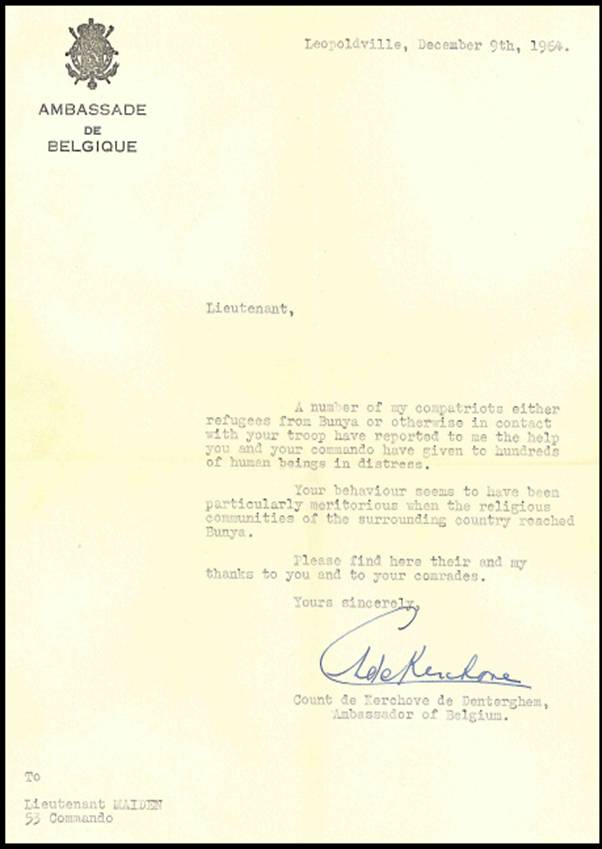
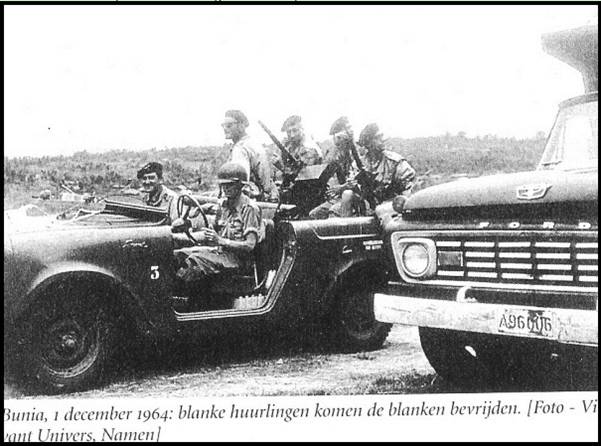
See letter from the Ambassador, mentioning the town of BUNYA – the above photo taken of the mercaneries as they enter BUNYA / BUNIA – Jack next to the driver ?
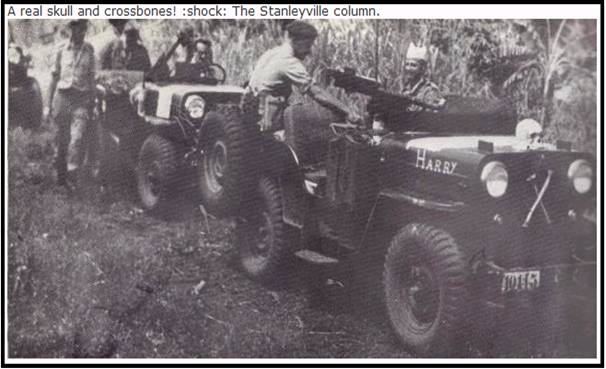
Further Excepts from Mike Hoare’s book “Congo Mercanary” Page 169 :
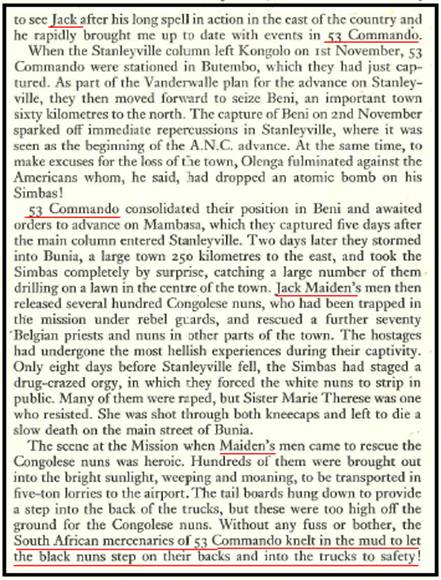
Also see pages 179, 180, 213, 222, 238
Sgt Maiden's Unit Histories
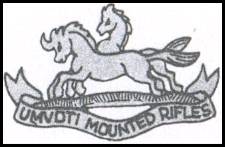
The Umvoti Mounted Rifles was formed in 1893 at Greytown, Natal by the re-designation of the left Wing of the Natal Carbineers. On 1 July 1913 the Regiment absorbed the Zululand Mounted Rifles, was re-designated the 4th Mounted Rifles (Umvoti Mounted Rifles) and transferred to Active Citizen Force of Union Defense Force.
In 1934 the Regiment was re-designated as the Umvoti Mounted Rifles and converted to infantry.The Natal Mounted Rifles served in the Second Anglo-Boer War (1899 - 1902), the Zulu Rebellion (1906 - 1907), World War I (specifically in South-West Africa from 1914 to 1915), World War II and South Africa's post-war internal conflicts and "Border War".
Umvoti Mounted Rifles Battle honours
South Africa 1879
South Africa 1899-1902
Relief of Ladysmith
Natal 1906
South West Africa 1914-1915
Western Desert 1941-43 (Note: As virtually the whole Regiment was captured at Tobruk in June 1942, there were no more World War II battle honours.)
|
|
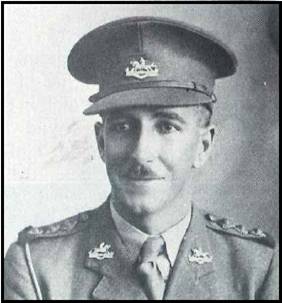 |
R.S.M. J.S.S. Martens Umvoti Mtd Rifles 1927-1934 & 1939-1945
|
|
Capt. D.M. McIntosh who commanded the remnants of the Regiment & joined the ILH to take part in the Fighting at the Battle of El Alamein |
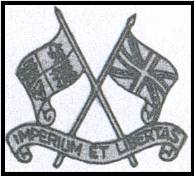
The 1st ILH (Imperial Light Horse) sailed from Durban to Egypt on 10 April 1941, as advance guard of the South African 2nd Infantry Division. Less than a year later the Regiment, as part of the 3rd Brigade of the South African 1st Infantry Division, played a crucial part in stopping Rommel's Afrika Korps during the First Battle of El Alamein. The unit subsequently took part in other fighting in North Africa, including the Second Battle of El Alamein.
Timeline for the battle of Tobruk Libya
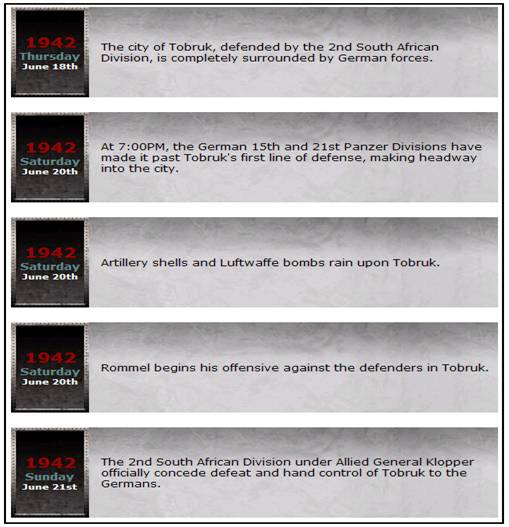
Rommel's victories in the spring of 1941 during the Western Desert campaigns failed to include this Libyan port which contained two Australian brigades under Maj-General Morshead. Rommel realized he must eliminate Tobruk before advancing into Egypt, but his forces twice failed to take it, and then a raid by the garrison netted two Italian infantry battalions. After he had received reinforcements, Rommel tried again, but was again repulsed
Rommel was now obsessed with taking this stubborn enclave behind his lines, but he was pre-empted from another all-out attack when the CRUSADER offensive was launched on 18 November 1941 by Auchinleck. As part of Auchinleck's plan, the garrison broke out of Tobruk and on the night of 26/27 November linked up with the 2nd New Zealand Division. This connection was temporarily severed by Rommel but within days his inadequate logistics forced his withdrawal and the siege was lifted.
However, in June 1942, after his successes in the Gazala battle, Rommel attacked the port from the least expected point, the south-east. By then Auchinleck regarded it as indefensible; on 20 June it fell, and nearly all the 35,000-strong garrison, which included one-third of South Africa's ground forces in Libya, became prisoners-of-war. The port remained in Rommel's hands until his retreat after the second El Alamein battle that November.
Siege of Tobruk May 1942
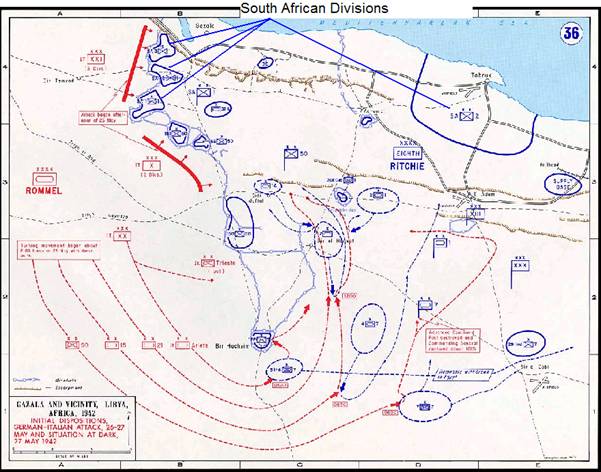
Order of Battle as at 20 June 1942, Tobruk
Division Troops
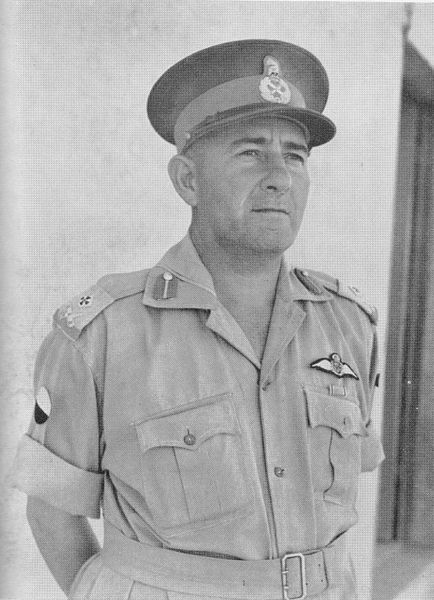
Maj.Gen. H. B. Klopper, Commander 2nd SA Inf Div at the surrender of Tobruk.
Paul Roo's Copyright 2010
|



